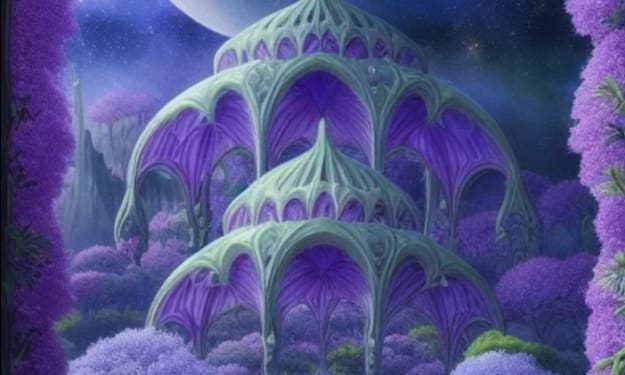Free Form Poetry
No Rules Since Time Began

The love of poetry begins at insight. Making the known or the impossible to know appealable to the senses. The pure expression of an art form in words. The perfection in simplicity or complex subject matter shining through. The early bards knew it so did Walt Whitman, T.E. Hulme, Richard Aldington, Ezra Pound and T.S. Eliot, to name a few. So if meter and rules have you going cross-eyed relax in the sphere of thought and let it roll. Let's not forget this classical approach to poetry.
From ancient Egypt to days of the Bible the original form of poetry was free form, almost always lyrical and the way to emphasize thought, philosophy, reason or love. You don't have to read poetry or study poetry to be a poet. Like anything, it is crafted and experience writing finely hones it. If you love writing it, it matters and it's good or will be.
The Only Rule Is There Are No Rules
To rhyme or not, any topic or any length, meter or musical patterns, are the non-considerations that form your perception. Start there. In fact, anywhere.
That doesn't necessarily make it easier to write. Some people prefer to work within a structured understanding and that gets their creative wheels turning. Meter, rhythm, coding helps them define their reason for creative output. Simply put, it makes more sense for them to organize their writing that way. While others like to free wheel it.
A style usually becomes known or predominant because people like it. Then they too approach the style in their work. Then it's a "thing."
A Little History
Also, called Free Verse poetry a bigger movement for this began in France, Verse Libre Form in the 1880s. Since the middle ages in France the only metrical form was the phrase. A complete sentence replaced the stanza and rhyme was a choice. The early free verse poets of France were Victor Hugo, Gustave Kahn, Jules Laforgue, Francis Viele-Griffin, and Eduard Dujardin. Their extreme independence made this form of poetry the modern tradition of the western world today.
From there England manifested it's own use of the form of verse by Aldington, Pound, Flint, and Hilda Doolittle, who along with many others who studied french poetry. They began the Imagist Movement with the aim “to compose in sequence of the musical phrase, not in sequence of the metronome.”
Branching out to America in the 1920's it was a reminder of what poetry was all about. Educational systems rising to rank and order, the field of literature itself ever pronouncing itself it made sense to have an evaluative stance and regard for uniformity, creating a system to organize thought with. That matched everything back then. Not so much now.
The first poetry magazine published in America by Amy Lowell promoted free verse poetry, 1912. Currently it dominates the field. The magazine also promoted any style or verse.
Honouring Cadence and Image
Walt Whitman was called the "father of free verse," and considered the pioneer of free form poetry. Here is an example of his work:
Out of the rolling ocean the crowd came a drop gently to me,
Whispering, I love you, before long I die,
I have travell’d a long way merely to look on you to touch you,
For I could not die till I once look’d on you,
For I fear’d I might afterward lose you."
The 10 Best Poems of Walt Whitman
Free Form or Free Verse Poetry is now the mainstay of poetic expression. It is literally hard to define poets under this category because it is the main form of poetry used today.
Personally, I started writing poetry over ten years ago. I had a dream, literally a lucid living dream of ancient Rome. Having nothing to do I went to the library to learn a little about that era. I discovered and fell in love with the Poet Virgil, yes indeedy he matched my dream. For fun I got a latin dictionary and spent the summer transcribing one of his books. I'm a bit of a nerd I guess. That and a little of Keats is actually all I know about the genre at all. Though my favourite writer is Hugo. So wishing upon star I sat and wondered if since I was so impassioned, this was meant for me. Where to start? I looked around my bedroom and saw a fan sitting on the floor and sunlight through the window...."breeze, what settled before me." I found my flow and no greater love do I have now.
Here is a list of 12 Types of Poetry to Know and ending on that note here is one of my own free verse poems.
That first poem I wrote on a hot summer day in 2004. Published in my 1st book of poetry in 2013.
A Saving Grace
It's a saving grace that choirs blessed this space
Like light to ear will only alter
Cadence rising
Peace then
A lovely tide is a dance
Ambient gestures like light composes our mind
In gracious stride
What grace brings such kindness
Does music know passion or the gift
Our music to our mind
Peaceful strides then
Impassioned pleas are song
Enlightened fruit
For the love of freedom longs
In the world's ever moving pendulum
Breeze, what settled before me
A once adored song
An anniversary in semaphore
A composer's gift
Does he know the lift song above gives
Linguistic pleasure to the heart
I give
by Lisa A Lachapelle
Copyright © 2023 Lisa A Lachapelle. All rights reserved.
Click on the bold link to read more of Lisa A Lachapelle’s work: Vocal Stories & Website
Leave a tip or a pledge if you wish to and I in turn will wish for you.
If you would like to be updated on all my writing just sign in to Vocal for free and click Subscribe on my work. Or brighten my day with an email [email protected]
About the Creator
Canuck Scriber L.Lachapelle Author
Published Poet and Author. Making rainy days feel like Sundays with words.
Reader insights
Outstanding
Excellent work. Looking forward to reading more!
Top insights
Compelling and original writing
Creative use of language & vocab
Easy to read and follow
Well-structured & engaging content
Excellent storytelling
Original narrative & well developed characters
Expert insights and opinions
Arguments were carefully researched and presented
Eye opening
Niche topic & fresh perspectives
Heartfelt and relatable
The story invoked strong personal emotions
Masterful proofreading
Zero grammar & spelling mistakes
On-point and relevant
Writing reflected the title & theme






Comments (5)
I wish the general public had a greater appreciation for poetry of all kinds. Free verse is what I love the most. It feels .... free and uninhibited and aligned with my soul. Thank you for the well-written overview, and your lovely first poem.- Anneliese
Poetry is like looking at other mirror of life, interesting read
💯🫶🏾Insightful
This was so fascinating! I didn't know all these things about poetry. Thank you so much for sharing this!
I don't know nearly enough about poetry- thank you for this explanation of your favorites. I tried something and read your poem backward- and it works great that way, too!